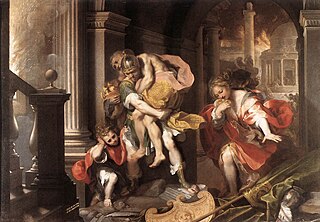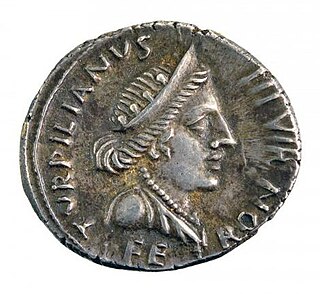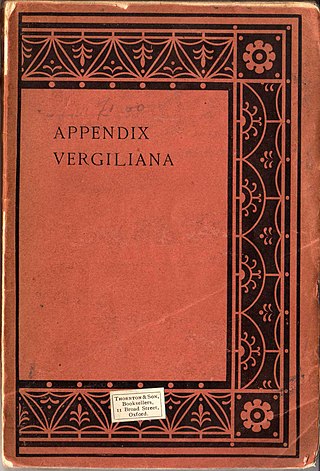Related Research Articles

In Greco-Roman mythology, Aeneas was a Trojan hero, the son of the Trojan prince Anchises and the Greek goddess Aphrodite. His father was a first cousin of King Priam of Troy, making Aeneas a second cousin to Priam's children. He is a minor character in Greek mythology and is mentioned in Homer's Iliad. Aeneas receives full treatment in Roman mythology, most extensively in Virgil's Aeneid, where he is cast as an ancestor of Romulus and Remus. He became the first true hero of Rome. Snorri Sturluson identifies him with the Norse god Víðarr of the Æsir.
In Greek mythology, Aeolus or Aiolos is a name shared by three mythical characters. These three personages are often difficult to tell apart, and even the ancient mythographers appear to have been perplexed about which Aeolus was which. Diodorus Siculus made an attempt to define each of these three, and his opinion is followed here.

Publius Vergilius Maro, usually called Virgil or Vergil in English, was an ancient Roman poet of the Augustan period. He composed three of the most famous poems in Latin literature: the Eclogues, the Georgics, and the epic Aeneid. A number of minor poems, collected in the Appendix Vergiliana, were attributed to him in ancient times, but modern scholars generally regard these works as spurious, with the possible exception of a few short pieces.

The Aeneid is a Latin epic poem that tells the legendary story of Aeneas, a Trojan who fled the fall of Troy and travelled to Italy, where he became the ancestor of the Romans. Written by the Roman poet Virgil between 29 and 19 BC, the Aeneid comprises 9,896 lines in dactylic hexameter. The first six of the poem's twelve books tell the story of Aeneas' wanderings from Troy to Italy, and the poem's second half tells of the Trojans' ultimately victorious war upon the Latins, under whose name Aeneas and his Trojan followers are destined to be subsumed.
Elymus was the supposed Trojan ancestor of the Elymians (Ἔλυμοι), an indigenous people of Sicily, in Greek and Roman legend.
Euryalus refers to the Euryalus fortress, the main citadel of Ancient Syracuse, and to several different characters from Greek mythology and classical literature:

In Roman mythology, Lavinia is the daughter of Latinus and Amata, and the last wife of Aeneas.
In Roman mythology, the Aeneads were the friends, family and companions of Aeneas, with whom they fled from Troy after the Trojan War. Aenides was another patronymic from Aeneas, which is applied by Gaius Valerius Flaccus to the inhabitants of Cyzicus, whose town was believed to have been founded by Cyzicus, the son of Aeneas and Aenete. Similarly, Aeneades was a patronymic from Aeneas, and applied as a surname to those who were believed to have been descended from him, such as Ascanius, Augustus, and the Romans in general.
In Roman mythology, Caeculus was a son of Vulcan, and the legendary founder of Praeneste.
In Greek mythology, Ilus is the name of several mythological characters associated directly or indirectly with Troy:

In Etruscan and Sabine religion, Feronia was a goddess associated with wildlife, fertility, health, and abundance, also venerated by the Faliscans and later adopted into ancient Roman religion. As the goddess who granted freedom to slaves or civil rights to the most humble part of society, she was especially honored among plebeians and freedmen. Her festival, the Feroniae, was November 13 during the Ludi Plebeii, in conjunction with Fortuna Primigenia; both were goddesses of Praeneste.
An aristeia or aristia is a scene in the dramatic conventions of epic poetry as in the Iliad, where a hero in battle has his finest moments. Aristeia may result in the death of the hero, and therefore suggests a "battle in which he reaches his peak as a fighter and hero".

The Appendix Vergiliana is a collection of Latin poems traditionally ascribed as being the juvenilia of Virgil.

In Greek and Roman mythology, Nisus and Euryalus are a pair of friends serving under Aeneas in the Aeneid, the Augustan epic by Virgil. Their foray among the enemy, narrated in book nine, demonstrates their stealth and prowess as warriors, but ends as a tragedy: the loot Euryalus acquires attracts attention, and the two die together. Virgil presents their deaths as a loss of admirable loyalty and valor. They also appear in Book 5, during the funeral games of Anchises, where Virgil takes note of their amor pius, a love that exhibits the pietas that is Aeneas's own distinguishing virtue.

Messapus, a character in Virgil's Aeneid, appears in Books VII to XII of the Latin epic poem. He was a son of Neptune, a famous tamer of horses, and king of Etruria, known for being one "whom no one can fell by fire or steel".

Iarbas was an Amazigh legendary character, who has was mentioned by the Greek philosopher and historian Plutarch as well as in works by various Roman authors including Ovid and Virgil. The character is possibly based on a real historical king of Numidia.
"Iarbas was the first being begotten, that he was born in the parched plain, and that he seized the sweet acorn of Jupiter."- Plutarch

In classical mythology, Cupid is the god of desire, erotic love, attraction and affection. He is often portrayed as the son of the love goddess Venus and the god of war Mars. He is also known as Amor. His Greek counterpart is Eros. Although Eros is generally portrayed as a slender winged youth in Classical Greek art, during the Hellenistic period, he was increasingly portrayed as a chubby boy. During this time, his iconography acquired the bow and arrow that represent his source of power: a person, or even a deity, who is shot by Cupid's arrow is filled with uncontrollable desire. In myths, Cupid is a minor character who serves mostly to set the plot in motion. He is a main character only in the tale of Cupid and Psyche, when wounded by his own weapons, he experiences the ordeal of love. Although other extended stories are not told about him, his tradition is rich in poetic themes and visual scenarios, such as "Love conquers all" and the retaliatory punishment or torture of Cupid.
Don Paul Fowler was an English classicist.

The Lusus Troiae, also as Ludus Troiae and ludicrum Troiae was an equestrian event held in ancient Rome. It was among the ludi ("games"), celebrated at imperial funerals, temple foundings, or in honor of a military victory. The lusus was occasionally presented at the Saecular Games, but was not attached regularly to a particular religious festival.
In Greek mythology, Nisus may refer to the following personages:
References
- ↑ Joseph Rykwert, The Idea of a Town: The Anthropology of Urban Form in Rome, Italy and the Ancient World (MIT Press, 1988), p. 96.
- ↑ Vergil, Aeneid 5.286ff.; see also Hyginus, Fabulae 273.14.
- ↑ Lee Fratantuono, Madness Unchained: A Reading of Virgil's Aeneid (Lexington Books, 2007), p. 141.
- ↑ Fredric V. Bogel, The Difference Satire Makes: Rhetoric and Reading from Jonson to Byron (Cornell University Press, 2001), p. 230; W.S. Anderson, The Art of the Aeneid (Bolchazy-Carducci, 2005, originally published 1969), p. 60.
- ↑ Vergil, Aeneid 10.753.
- ↑ Odyssey 8.119, 370; Francis Cairns, Virgil's Augustan Epic (Cambridge University Press, 1989), p. 230.
- ↑ Plutarch, Life of Numa 13.4.